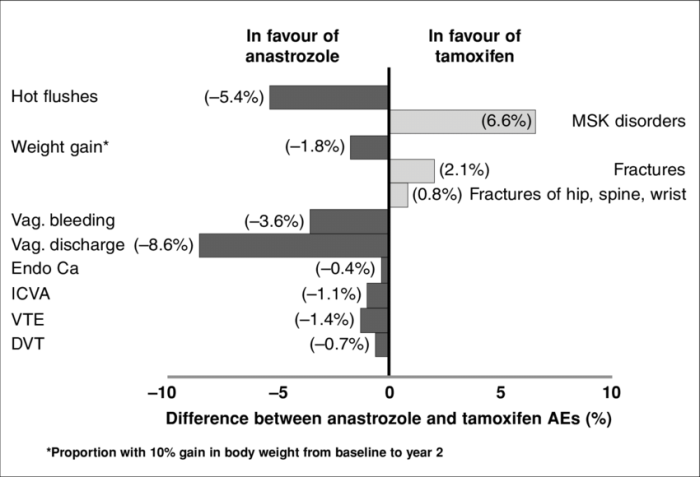Anastrozole side effects are a common concern for patients taking this medication, a potent aromatase inhibitor used primarily to treat breast cancer. While anastrozole offers significant benefits in fighting cancer, it’s essential to understand the potential side effects associated with its use. This article will explore the most common and serious side effects of anastrozole, discuss strategies for managing them, and address frequently asked questions.
Anastrozole works by blocking the production of estrogen, a hormone that can fuel the growth of certain breast cancers. While this mechanism effectively combats the disease, it can also lead to various side effects, primarily due to the reduction in estrogen levels. These effects can range from mild and manageable, such as hot flashes and joint pain, to more serious concerns like cardiovascular problems and bone health issues.
Anastrozole and Interactions

Anastrozole, a medication used to treat hormone-sensitive breast cancer, can interact with other medications, supplements, and herbal remedies. These interactions can alter the effectiveness of anastrozole, increase the risk of side effects, or lead to other health problems. Understanding these interactions is crucial for managing your health and ensuring the safe and effective use of anastrozole.
Potential Drug Interactions with Anastrozole
Drug interactions occur when one medication affects the way another medication works in the body. This can happen in several ways, including:
- Altering the absorption, distribution, metabolism, or excretion of a medication
- Competing for the same binding sites in the body
- Increasing or decreasing the effectiveness of a medication
- Increasing the risk of side effects
Anastrozole can interact with various medications, including:
- Other medications used to treat breast cancer: Anastrozole may interact with other medications used to treat breast cancer, such as tamoxifen, aromatase inhibitors (such as letrozole or exemestane), and chemotherapy drugs. These interactions can increase the risk of side effects or reduce the effectiveness of the treatment.
- Medications that affect the liver: Anastrozole is metabolized by the liver, and medications that affect liver function can alter the metabolism of anastrozole. This can lead to higher or lower levels of anastrozole in the body, potentially affecting its effectiveness or increasing the risk of side effects. Examples of medications that can affect liver function include antifungal medications, anti-seizure medications, and antibiotics.
- Medications that affect the CYP3A4 enzyme: Anastrozole is metabolized by the CYP3A4 enzyme, which is responsible for metabolizing many medications. Medications that inhibit or induce CYP3A4 can alter the metabolism of anastrozole, affecting its effectiveness or increasing the risk of side effects. Examples of medications that can affect CYP3A4 include grapefruit juice, certain antibiotics, antifungal medications, and some anti-HIV medications.
Potential Interactions with Supplements and Herbal Remedies, Anastrozole side effects
Anastrozole can also interact with certain supplements and herbal remedies, particularly those that affect hormone levels or liver function.
- Supplements and herbal remedies that affect hormone levels: Some supplements and herbal remedies can affect hormone levels, which may interact with anastrozole’s mechanism of action. Examples include soy products, black cohosh, and ginseng.
- Supplements and herbal remedies that affect liver function: Supplements and herbal remedies that can affect liver function may also interact with anastrozole, potentially altering its metabolism and effectiveness. Examples include St. John’s wort, garlic, and green tea.
Minimizing the Risk of Drug Interactions
To minimize the risk of drug interactions while taking anastrozole, it is crucial to:
- Inform your healthcare provider about all medications, supplements, and herbal remedies you are taking, including over-the-counter medications and vitamins. This includes prescription medications, non-prescription medications, herbal remedies, and dietary supplements.
- Do not start or stop any medication or supplement without first consulting your healthcare provider. They can assess the potential risks and benefits of any changes to your medication regimen.
- Read the medication guide and package insert that comes with your anastrozole prescription. This information provides important details about potential drug interactions and other safety information.
- Be aware of the potential for interactions with grapefruit juice. Grapefruit juice can inhibit the CYP3A4 enzyme, which can affect the metabolism of anastrozole. Avoid consuming grapefruit juice while taking anastrozole.
Mechanisms of Drug Interactions
The mechanisms behind drug interactions can be complex, but some common mechanisms include:
- Pharmacokinetic interactions: These interactions occur when one medication affects the absorption, distribution, metabolism, or excretion of another medication. For example, a medication might increase the metabolism of anastrozole, leading to lower levels of the drug in the body.
- Pharmacodynamic interactions: These interactions occur when two medications have similar or opposing effects on the body. For example, two medications that both lower blood pressure could lead to dangerously low blood pressure.
Consequences of Drug Interactions
The consequences of drug interactions can vary depending on the specific medications involved and the individual’s health status. Potential consequences include:
- Reduced effectiveness of medications: Interactions can reduce the effectiveness of anastrozole or other medications, making them less effective in treating the underlying condition.
- Increased risk of side effects: Interactions can increase the risk of side effects, including more severe or uncommon side effects.
- Toxicity: In some cases, interactions can lead to toxicity, which can be harmful to the body.
Patient Resources and Support

Living with the side effects of anastrozole can be challenging, but you’re not alone. There are many resources available to help you navigate this journey.
Reliable Resources for Information
Understanding your treatment options and potential side effects is crucial. Here are some reliable resources that can provide accurate information about anastrozole:
- The National Cancer Institute (NCI): The NCI offers comprehensive information on cancer treatments, including anastrozole, as well as support resources for patients and their families. Their website, cancer.gov, is a valuable source of information.
- The American Cancer Society (ACS): The ACS provides detailed information about breast cancer, including treatment options and side effects. You can find information on anastrozole on their website, cancer.org.
- Your healthcare provider: Your doctor, nurse, or pharmacist can provide personalized information about anastrozole and its potential side effects. They can also answer any questions you have and help you manage any side effects you experience.
Patient Support Groups and Online Communities
Connecting with others who understand what you’re going through can be incredibly helpful. Patient support groups and online communities offer a safe space to share your experiences, ask questions, and receive emotional support.
- Support groups: Many hospitals and cancer centers offer support groups for patients receiving treatment for breast cancer. These groups can provide a sense of community and allow you to share your experiences with others who are going through similar challenges.
- Online communities: Online forums and social media groups dedicated to breast cancer can provide a platform for connecting with others who understand what you’re going through. These communities can offer support, advice, and a sense of belonging.
Tips for Managing Side Effects
Managing the side effects of anastrozole can be challenging, but there are strategies that can help.
- Communicate with your healthcare provider: Don’t hesitate to discuss any side effects you experience with your doctor. They can help you manage these symptoms and adjust your treatment plan if necessary.
- Explore lifestyle changes: Consider making healthy lifestyle changes, such as eating a balanced diet, exercising regularly, and getting enough sleep. These changes can help improve your overall well-being and may alleviate some side effects.
- Seek support: Don’t be afraid to reach out for support from family, friends, or support groups. Talking about your experiences and feelings can help you cope with the emotional and practical challenges of managing side effects.
Anastrozole Side Effects

Anastrozole, an aromatase inhibitor, is a medication commonly used to treat hormone-sensitive breast cancer. While it effectively blocks the production of estrogen, it can also cause various side effects. It’s crucial to understand these potential side effects and consult with your doctor if you experience any concerning symptoms.
Understanding Anastrozole Side Effects
Anastrozole side effects can vary from person to person, and not everyone will experience them. However, it’s essential to be aware of the potential risks and seek medical attention if necessary.
- Musculoskeletal Pain: Anastrozole can cause joint pain, muscle aches, and stiffness. These symptoms are often reported in the arms, legs, and back.
- Bone Health: Anastrozole can lead to a decrease in bone mineral density, increasing the risk of osteoporosis and fractures.
- Cardiovascular Issues: Some studies have linked anastrozole to an increased risk of cardiovascular events, such as heart attacks and strokes.
- Hot Flashes: Hot flashes are a common side effect of anastrozole, caused by the medication’s effect on estrogen levels.
- Vaginal Dryness: Anastrozole can lead to vaginal dryness due to reduced estrogen levels.
- Skin Changes: Some individuals may experience skin changes like dryness, itching, or rashes while taking anastrozole.
- Mood Changes: Anastrozole can affect mood and lead to depression, anxiety, or irritability.
- Other Side Effects: Less common side effects of anastrozole can include headaches, nausea, vomiting, and weight gain.
Navigating the landscape of anastrozole side effects requires a balanced approach. Open communication with your healthcare provider is crucial for identifying and managing any potential issues. While side effects can be a concern, understanding them empowers you to make informed decisions about your treatment and maintain a good quality of life. Remember, the benefits of anastrozole in treating breast cancer often outweigh the potential risks, and with careful monitoring and management, you can successfully navigate this journey.
Anastrozole is a medication commonly used for breast cancer treatment. While it can be effective, it’s important to be aware of potential side effects. One common side effect is joint pain, which can sometimes be quite bothersome. In contrast, medications like symbicort 160 , used for asthma, often have different side effects, such as dry mouth or a sore throat.
However, it’s always best to consult your doctor if you experience any concerning side effects while taking anastrozole.